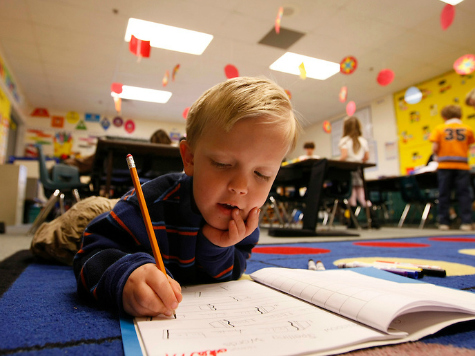
On Friday, a Colorado elementary school student was forced to take a state literacy skills test by his teacher after his parents had requested that he be opted out of federal and state testing.
Jess Loban of Castle Rock, Colorado told Breitbart News that he and his wife informed their children’s school that they were opting them out of the Common Core PARCC and CMAS assessments, as well as other state and federally-mandated tests, but on Friday discovered that their son’s teacher had forced him to take the DIBELS, a test used by the state to assess reading skills.
Loban said when his son’s teacher began forcing him to take the test, he “collapsed on the floor at school.”
“There was no explanation from the school on why they forced my son to take the test,” he added. “Afterward, the vice principal told the teacher, ‘You’re not supposed to force him to take it,’ but it seemed she wasn’t aware of our decision to opt him out.”
“They said they allowed our son to call his parents, but we have no record of any phone calls from the school,” said Loban, who is a Libertarian candidate running for Congress from Colorado’s fourth district, and is staunchly opposed to the Common Core standards.
He said he and his wife have meetings scheduled this week with the school district.
Loban noted that more parents are apprehensive of Common Core and are opting their children out of the Common Core-aligned assessments as well as other state-and-federally-mandated tests.
Consequently, supporters of the initiative are likely growing anxious that they will not have the student data the Common Core standards were supposed to generate.
“Common Core has become a social issue and a very personal one,” Loban said. “Whenever an issue impacts our children, it becomes a different issue. Adults may be willing to give up some of their own privacy, but when you know it’s going to affect your kids, that’s something entirely different.”
Cheri Kiesecker, another Colorado parent, told Breitbart News that she found out about Common Core about a year ago, and since then has worked to write bills that would delay the controversial standards’ implementation and the associated tests.
“Our ‘Moms’ Bill’ was killed in committee,” Kiesecker, a Fort Collins parent, said, reflecting on her experience.
“I was never involved in politics really, and I’ve been a registered Democrat,” she continued. “Now, I really don’t consider myself to be a member of any political party at all, but I know I won’t vote for anyone who is pro-Common Core.”
“Colorado has a Democrat majority, and the Democrats voted against our data privacy bill that the Republicans proposed,” Kiesecker explained. “Parents are pushing back on data privacy.”
The bill would have required parental permission for the collection of various types of personal student information, and created security requirements for student data, including fines for any officials who breached student confidentiality.
“Democrats have had to walk a fine line between showing sensitivity to the issues while killing bills that would be disruptive to the state’s accountability and data systems,” wrote Todd Engdahl at Chalkbeat in April.
“The State Board of Education said I couldn’t see my own child’s education records because they said they could not ‘verify’ that I was the parent,” Kiesecker said. “A birth certificate was not good enough for them.”
As Breitbart News reported in July, Dan Damagala, Colorado Department of Education’s CIO of Information Management Services [in video above], told Kiesecker, “The Colorado Department of Education does not have a mechanism for verifying parent/guardian relationships to students – and the release of student information to an unauthorized entity would be violation of Family Educational Rights and Privacy Act (FERPA).”
In addition to its $73 million Race to the Top grant from the federal government, Colorado also received $17.4 million additional dollars to build the State Longitudinal Data System (SLDS) in 2010. Since all states now have an SLDS database, regional data centers have also formed that allow states to share and compare student data, creating what amounts to a national database of student information.

COMMENTS
Please let us know if you're having issues with commenting.